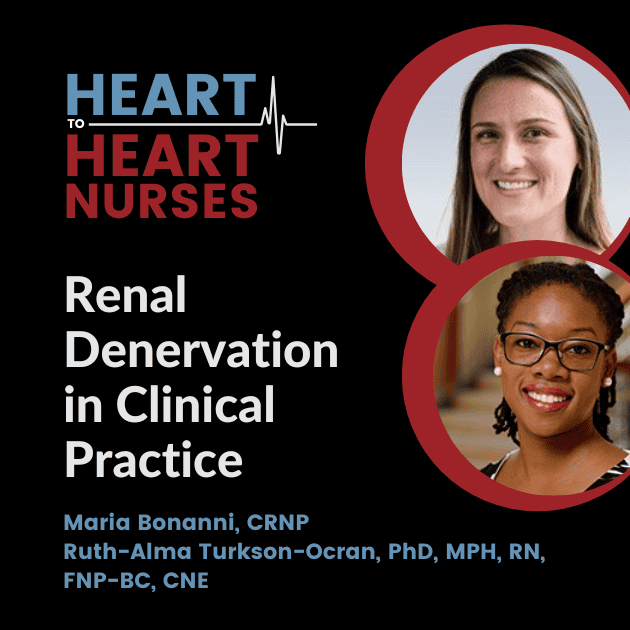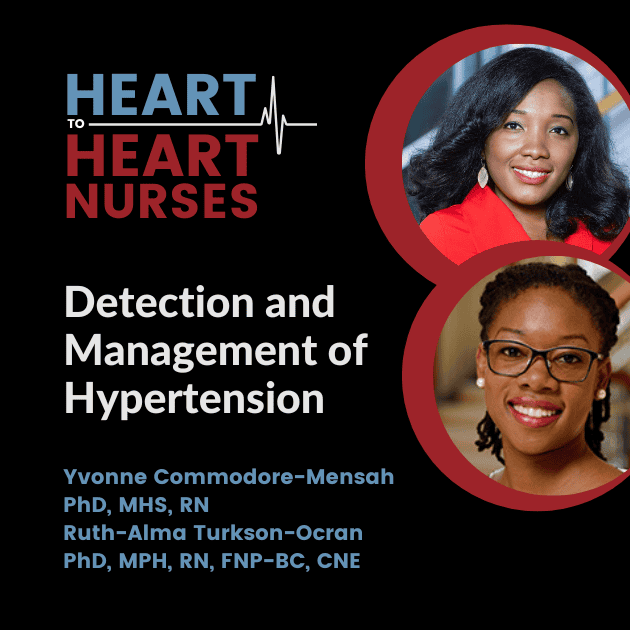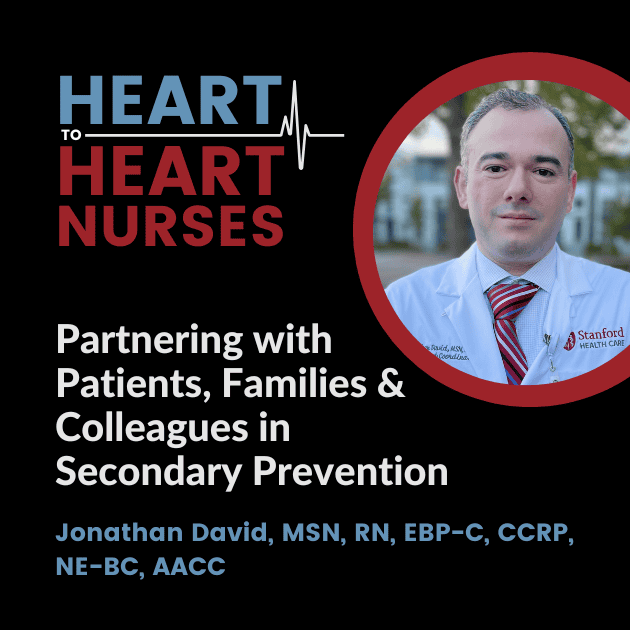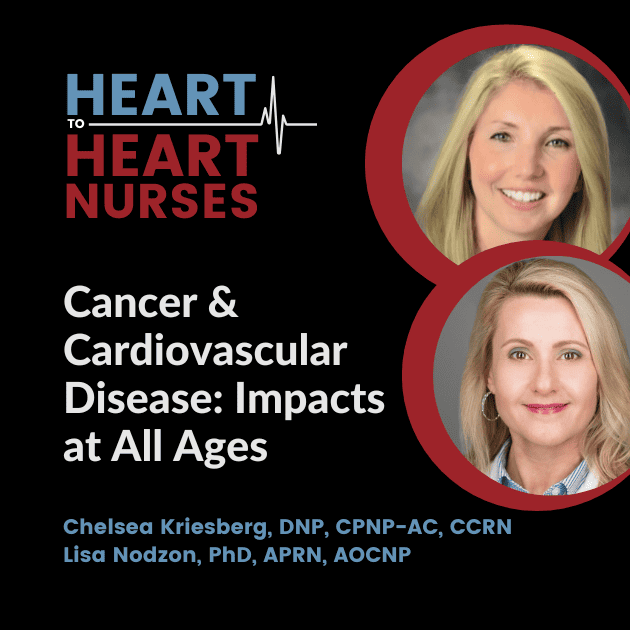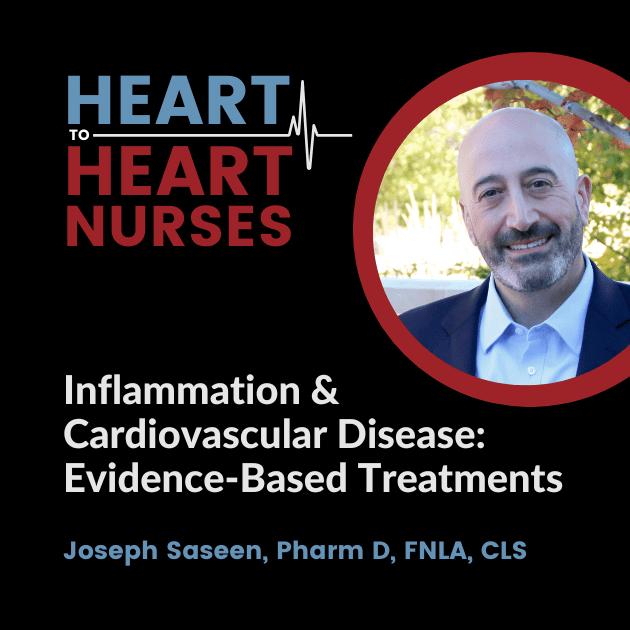Improving outcomes for patients with cardiovascular disease requires team-based care and effectively addressing multiple risk factors. Guest Barbara Fletcher, RN, MN, FAHA, FPCNA, FAAN, highlights prevention strategies, and how nurses across the globe can learn from the Cardiovascular Nursing Certificate program.
Episode Resources
Welcome to Heart to Heart Nurses, brought to you by the Preventive Cardiovascular Nurses Association. PCNA's mission is to promote nurses as leaders in cardiovascular disease prevention and management.
Geralyn Warfield (host): Thank you so much for joining us today. We have the opportunity to talk with Barbara Fletcher, who's going to be speaking with us about global cardiovascular disease prevention and international outreach. Barbara, why don't you give us a brief introduction about yourself?
Barbara Fletcher (guest): I will. I'm one of the founding members of the Preventive Cardiovascular Nurses Association and I am currently at the University of North Florida in Jacksonville, Florida. My background is clinical work, has always been cardiac rehabilitation, exercise testing, training, and so forth, and my research has been in that field as well.
So, I'm on the [00:01:00] International Committee is probably the reason you've asked me to participate today on, on this topic. So, I can speak to that from that committee.
Geralyn Warfield (host): Wonderful. Well, before we get too far into the international realm, I'm just really curious. You are a seasoned professional and I'm wondering what advice you would give someone who's just starting out in their nursing career.
Barbara Fletcher (guest): Just starting out. Well, first of all, it comes to mind to be a team player. We have to be, and I have been that all my career, and it's paid off. Cardiovascular care is getting so complex. It's unbelievable. I'm glad I'm in the twilight of my career, not just starting out, but it is complex. It's nothing simple about it. And that alludes to the fact it's even more imperative to have the, a team, that you can count on, that you can go to, and that, you know, you can delegate and so forth.
And I think the other thing that would come to mind, you know, we had the buzzwords now, patient-centered care and shared decision-making. And I do think we, as cardiovascular nurses have, have, really participated in that. We didn't call 'em those fancy names, but we, we've done patient-centered care all our life. We've done shared decision making. Shared decision-making and [00:03:00] patient-centered care are here to stay and I'm glad it's finally defined by professionals, because it means a lot and I think it is improving clinical outcomes.
So, I would say, just to summarize your question, I would emphasize the team approach, and I would emphasize to continue with patient-centered care and shared decision making.
Geralyn Warfield (host): So, it definitely takes a lot of skills beyond what we learned in nursing school to be a great team member, to know who to go to for to for information: they might be within your current network, wherever you're working, or it might be beyond that.
Barbara Fletcher (guest): Correct.
Geralyn Warfield (host): So, I'm actually curious, Barbara, how you might suggest for a new nurse how they might develop these relationships with people that perhaps they don't have in their inner circle of people that they have at work.
What kind of strategies would you suggest to them?
Barbara Fletcher (guest): Well, I think you know, it, it just, it [00:04:00] actually depends on the personality of that cardiovascular nurse and some, you know, it goes back to all of us. Some are more introverted, some are more extroverted.
You've really got to have that relationship with other people. And, you know, it's, it's just, that's, that's the name of the game. You, you can have your inner circle, which is good. But you also, that inner circle gives you the opportunity to reach out. And you reach out, you know, through, I think, it is major organizations like PCNA, like American Heart, and, and then you develop a, a network that you need around, around the globe, if you will.
Geralyn Warfield (host): Great. What a, what a wonderful suggestion. And I think one of the things as you are starting out in a new career, and maybe you are starting out in a new organization with which you're not very familiar, you know, just finding what [00:05:00] works for you and obviously of course, what works for your patient, and building the best team you possibly can.
Barbara Fletcher (guest): Yeah.
Geralyn Warfield (host): So, thinking about the role of a nurse in cardiovascular disease prevention as part of this team that we are discussing, what kinds of things would you want us to know about that role?
Barbara Fletcher (guest): Well, let me just say that I think prevention—whether you're talking primary, secondary, tertiary—spans every patient, so it should be included in anything you do. I don't care if the, the patient's being treated for heart failure, atrial fibrillation, transplant, we need to incorporate prevention.
And I, I'd ironically, I pulled this off as this is American Heart Association’s Annual Heart Disease and Stroke Statistical Update. And you can get the full thing [00:06:00] on the web, but it highlights eight bullet points. And of those eight bullet points, six of the eight are preventive. We, it is, for instance here, I'll just paraphrase some of it.
9.8 million adults have undiagnosed diabetes. 28 million have diagnosed diabetes. 114 million adults have pre-diabetes. So that's huge. And so we can address prevention. And when I say prevention, you know, it's lifestyle intervention, but I don't think we can forget the therapies and the medications these go in, you know, medication adherence is certainly part of prevention. So, diabetes.
Next bullet is hypertension. We've got 48% of US adults with hypertension. The next bullet is high LDL cholesterol. We have 28% [00:07:00] with elevated cholesterol currently, and then this is scary. The next one is related to e-cigarettes and 1 in 5 high school students in the United States used e-cigarettes within the past 30 days.
10% of us adults don't even come near meeting the dietary guidelines for heart healthy diet. And it's just other things like exercise. If we could increase a thousand steps a day, then that would be associated with a 10% lower metabolic syndrome. It alludes to the fact of the benefits of physical activity in our cardiovascular patients and outcomes.
So based on that, I strongly believe we have to do prevention across every patient that we see. [00:08:00]
Geralyn Warfield (host): So [00:09:00] being part of an effective team helping a patient have the best outcomes to prevent cardiovascular disease you've described as, definitely something that every nurse everywhere is responsible for in whatever perspective they can provide. So you have seen some changes in cardiovascular disease prevention and management over the years and one of the things that I've noticed in talking to speakers in recent times is just, it used to be that everybody had their specialty and for example, a cardiovascular nurse was not as involved in diabetes care. And so we're seeing a lot more overlap, a lot more involvement, a lot more, relationship building outside of the cardiovascular field.
And, would it be accurate for me to say that a cardiovascular nurse is more like a traffic director in some ways as well as those other [00:10:00] descriptors that you have used? Because a lot of times they're navigating insurance. They are trying to make sure that their patient gets an appointment at the next specialist's office, that they are working with endocrine or nephrology or whatever it is. So, is that an accurate assessment?
Barbara Fletcher (guest): That that's a very accurate assessment. And I think what you're alluding to is case management, which we have some, very expertise in cardiovascular nursing efforts here in case management that come into mind: the group at Stanford, a group at Hopkins, we have excellent research showing out better clinical outcomes with case management. So, I think that's, that's a very important point.
Geralyn Warfield (host): Great. Well, we're going to take a quick break and we'll be right back with Barbara Fletcher.
Geralyn Warfield (host): And we're back with Barbara Fletcher. We're going to switch gears just a little bit and focus a little bit more outside of the US and thinking internationally in scope.
So, I know that the Preventive Cardiovascular Nurses Association has [00:11:00] worked internationally for quite some time, but I'm wondering if you could talk a little bit about the Global Cardiovascular Nurse Leadership Forum.
Barbara Fletcher (guest): Yes, and I'm, it is very near and dear to my heart because I was on that committee when it started. But the mission of, we call it GCNLF, Global Nursing Leadership Forum, is to promote the role of nurses and nursing in global cardiovascular prevention and management across the lifespan. So, this, that is built right into it upfront.
What we're trying to do through the global leadership and international outreach is elevate the role of nurses around the world. And we're going to do this I think by, we're trying to level the playing field, if you willAnd, and that being said, PCNA leaders, with international nurse leaders, has developed a nursing certificate program, which I think will address, that I know will address that.
The certificate includes many aspects of education on cardiovascular disease, but prevention is certainly among that. [00:13:00] And this promotion of this certificate through GCNLF is going enhance cardiovascular nursing worldwide. If cardiovascular disease is, is largely, largely a byproduct of, of lifestyle and genetics, our job is to ultimately prevent this. Now genetics is another thing, but we certainly have expertise in behavior change to address prevention. And we have the responsibility to in, include all those complex therapies, whether they be the new medications that are coming out, that, that we can really make a difference in prevention.
We have, we have the tools at our side now.
Geralyn Warfield (host): So, some nurses have full prescribing authority depending upon where they are. Others might just be seen as an assistant in procedures; might be more of a, have more of an administrative, otherwise known as a secretarial, perhaps, role, depending upon where in the, the world they might be.
So, the global nursing certificate is intended for them to increase both their knowledge and their skills as well as their competence and confidence in being able to attend to all the needs of all these patients that are increasing in number; that have comorbid conditions, so they're very complex; and that can, again, lead towards better patient outcomes.
Are there any other things about the certificate program that you would point to in terms of importance that our audience should know?
Barbara Fletcher (guest): Yeah. Well, first of all, you can find out more information about the cardiovascular nursing certificate. It's not a certification. I think it's an important factor here. It's not something you have to renew it. Once you have it, you have it. It's a certificate that you have taken this program and achieved a passing grade. So, it's 12 modules. It's interactive. It is online so you don't have to go somewhere to take it.
And these 12 modules, like I, I think I previously said, it does have prevention in, included. [00:16:00] It's, it takes about 15 to 18 hours to complete the 12 modules, and we would hope that they would complete it, you know, at the leisure, but in about three months.
It's going to elevate the role of nursing as we've been talking about on the global [00:17:00] scale. And we're going to improve, most of all, clinical outcomes. I think it's going to be very important.
Geralyn Warfield (host): So, this certificate program, is it available for people here in the U.S. to take as well as people elsewhere?
Barbara Fletcher (guest): Oh yeah, sure. Yeah. Okay. It is.
Geralyn Warfield (host): Great.
Barbara Fletcher (guest): Yeah. There is a cost, but there is scholarships available as the minimal cost.
Geralyn Warfield (host) So, Barbara, I know you have a lot of experience in interacting with international audiences who are nurses, and I'm wondering what similarities you see between the complexities of the things that they are trying to accomplish, and the things that our nurses that might be listening are. Obviously, we've talked a little bit about how there's some differences in terms of scope of practice and how they're seen by other professionals and maybe even seen by their patients.
But what similarities do you see between all these global cardiovascular nurses [00:22:00] no matter where they are?
Barbara Fletcher (guest): They are all extremely interested in cardiovascular prevention. And the programs and the organizations like Chilean Society of Cardiovascular Nurses, the European Society of Cardiovascular Nurses, they, they all are very common, have things in common, and, and I think that, that they are a very dynamic organizations around the globe. So, I think we all have the same mission, we all have the same goals, objectives, and I think that's how we are going to really make a difference.
Geralyn Warfield (host): Great. Is there [00:23:00] anything else about nursing in general or international nursing that you would like to share that I've neglected to ask about so far?
Barbara Fletcher (guest): Well, let's see. No., I think nurse, we need to keep nurses in the forefront. We are the most trusted profession, and I think that makes a difference in, in achieving goals that we want to achieve.
Geralyn Warfield (host): I would, I would agree that being the most trusted profession is something that we not, we should not take for granted. In spite of all the things that have happened during the Covid Pandemic and other things that are happening, that we know that what we do every single day makes a difference to our [00:24:00] patients, to their families, to their caregivers, and together we are making strides towards cardiovascular prevention and management across the globe.
Barbara Fletcher (guest): We are.
Geralyn Warfield (host): Well, thank you so much for being with us today, Barbara Fletcher. We have so enjoyed having the opportunity to speak with you. This is your host, Geralyn Warfield, and we will see you next time.
Thank you for listening to Heart to Heart Nurses. We invite you to visit staging-pcnasite.kinsta.cloud for clinical resources, continuing education, and much more.
Subscribe Today
Don't miss an episode! Listen to the Heart to Heart Nurses podcast on your favorite podcast listening service.







